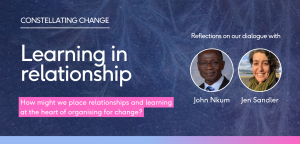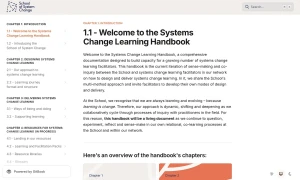Anna is the CEO (Chief Enabling/Evolving Officer) at the School of System Change. This article, Learning is Change, is part of a series exploring our intentions for inquiry and storytelling through six key themes as we live into our new way of being at the School.
Life is learning.
Life is change.
You live, you learn, you change.
You change, you learn, you live.
The Oxford Dictionary describes learning as the acquisition of knowledge or skill by studying, experience or being taught. We often understand learning as a transactional, linear process, in which we are given knowledge in and by formal institutions. However, most learning happens through doing, practising and experiencing the world. We see this in our children, in how they develop as infants, in how they engage with others, long before they reach formal education. Personally, I experience this most acutely as a parent, in my constant adaptation to my children’s changing needs as they grow and change through their numerous stages of life. I’m sure many parents can relate; that just when you think you’ve cracked it, our children change again, and so must our parenting styles and who we are as parents. We change because they change in response to their changing world and their changing perception of the world.

Learning is just that: the process of adapting to the conditions and environment around us. Borrowing the words of applied systems thinker Robert Louis Flood, we are “learning into an unknowable future” (Flood, 1999); we are forever learning to live into the change of our dynamic world. Learning is a continuous process that weaves and binds us together, constantly reshaping how we relate to others. As such, all learning is relational.
The unknowability of the future can feel unsettling, especially as systems around the world are failing, faltering and fraying at the edges. For those working in change movements, work can feel increasingly difficult in increasingly strained circumstances. Current paradigms often adopt mechanical and linear strategies and don’t yield the desired outcomes. This can feel disheartening. We hear from those within the field that they are feeling overwhelmed by complexity, they are feeling frozen by uncertainty, and they are afraid of the volatility.
Learning to navigate complexity, uncertainty and volatility asks us first to view the world systemically: to understand the world as alive, dynamic and ever-changing, and then see ourselves as alive, dynamic and ever-changing. Learning is, therefore, not the handover of understandings of the world, it is the process of cultivating the ability to be in the world as it changes. Learning is the process of developing, flourishing and evolving.
As we seek to cultivate the conditions for change, we can position learning as the beating heart of the process. Learning isn’t the vehicle for change. It is change. Therefore, learning is the strategy process — from exploring the dynamics in the system, experimenting, testing and shifting what you do as you learn how systems respond. Organisations and collectives seeking change can gather around and be guided by intentional questions and inquiries rather than planned linear processes and set goals. Monitoring and evaluation can be woven into this as processes of learning and adapting and not conducted at the end, or by an external consultant.
In my experience of working with a number of organisations, intentionally increasing people’s capability to move with change and learn to do the work is undervalued. Yet, this ability is the lifeblood of any organisation, whether it’s recognised or not. Learning increases vitality, in organisations as well as in those who work for them; it also increases the felt sense of agency to explore the process of cultivating change, to experiment, to test things out, to observe and learn through our own experiences. For me, approaching my work as a continual state of learning brings me alive, allowing me to live life as an inquiry, with curiosity, following questions, seeking insights from others, be it in books or conversations, inviting reflexive feedback from others, and feeling into who and where I am as a relational being.
At the School of System Change, we exist to nurture a systemic, living paradigm, where learning is change. We bring a multi-method approach to systems change learning, in which we convene many contributors to curate our programmes and partnerships, and we support people and teams to learn and practice together. Guiding everything at the School is action inquiry: an adaptive process of practising, taking action and reflecting and learning through the experience of affecting change. We learn alongside our partners as they build their capacity to do the work that is needed rather than us acting as consultants. We look to irrigate networks with systems change capacity, supporting the flow of learning through courses and resources and creating the conditions for sustained learning. We believe that learning is the essence of change, and it’s an essential part of what we do collectively and as a network.
The world is alive and constantly evolving. In seeing ourselves as part of this dynamism, we may recognise our learning as the course of evolution. We may pass down knowledge and accept knowledge from others, but working with change asks and invites us to lean into the paradigm that learning is change. It invites us to recognise that this will be a forever unfolding process.
I often still feel overwhelmed and unsure of what to do and how to be — be it dealing with my teenager’s anxiety or preparing for a future that tumbles further into ecological and climate chaos. In turbulent times, it can feel like a struggle to keep our heads above water, both in our work and our daily lives. What keeps me surfing the waves is returning to my process of learning, back to my questions and abilities to navigate what is in front of me, learning as I go. Finding ways to support people, teams and networks as part of their learning journey is why I and many at the School do this work, as we all live and learn into change.
References
Flood, R.L. (1999) Rethinking The Fifth Discipline: Learning Within the Unknowable. Routledge.





